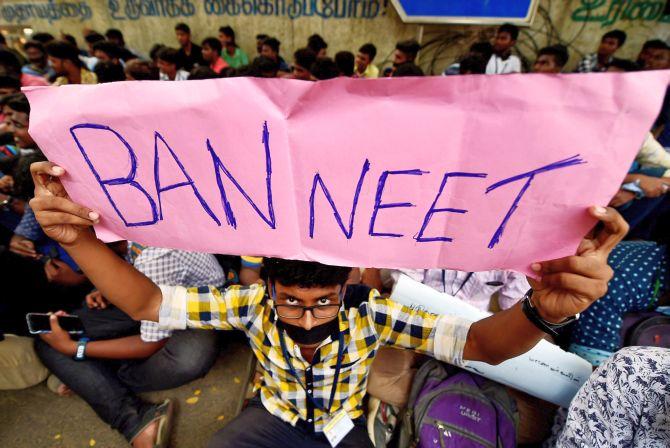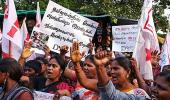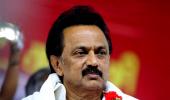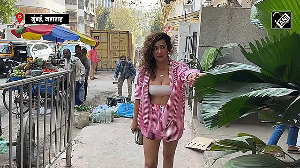Once the Covid crisis subsides in the state, the NEET exam this year, whether conducted or cancelled, could become an electoral issue next year, along with the BC-MBC reservations issue, especially the ‘creamy layer’ aspect, says N Sathiya Moorthy.

Though the continuing Covid crisis has been engaging the energies of the ruling AIADMK ministers in Tamil Nadu, the realities of the assembly polls, due by May next year, keeps reminding the state’s divided polity of the electoral issues that could sway the voters.
While the pandemic-centric medical and economic crisis management and attendant charge of governmental corruption flagged often by Opposition DMK Leader of the Opposition M K Stalin, may be central to rival poll campaigns, traditional Dravidian concerns focussed on caste-based reservations could still manage to sway the voters.
Based on claims of vacancies in NEET-based medical seats in the state, the DMK first and the AIADMK and the rest not long after moved the Supreme Court, seeking directions for filling up those vacancies with existing candidates from BC-MBC communities. Citing a January ruling of the court, a three-judge bench, while appreciating the joint initiative of the state’s political parties on issues such as this one, directed them to go the Madras high court instead.
The January ruling said that unlike SC-ST quotas, which were built into the Constitution at inception, BC-MBC reservations, introduced through the First Amendment in 1951, were only a ‘constitutional right’ and not a ‘Fundamental Right’ under Chapter III. Hence, the writ jurisdiction of the Supreme Court would not apply to the present case, according to the June verdict.
On July 13, the Supreme Court reiterated that the high court should hear the case ‘expeditiously’ and dismissed the Centre’s argument that a similar case from Uttar Pradesh was already pending before the apex court. Counsel state government, as also the DMK Opposition, submitted that the Centre was ‘misleading’ the SC by citing before the high court a case that was specific to UP and would not apply to Tamil Nadu and to the substantive matters mentioned.
The question arises if the January verdict itself may have to go before a larger bench, including a multi-member Constitution Bench of the Supreme Court. The First Amendment made facilitating changes to Article 16, which falls under Chapter III of the Constitution. Hence, the argument that BC-MBC reservations too should be constructed as a ‘Fundamental Right’. Be that as it may, the two verdicts this year aspects only the procedural part, and not substantive issues relating to BC-MBC reservations scheme.
The same cannot, however, be said about more recent reports of the Centre considering changes to criteria for identifying the ‘creamy layer’ for denial of reservations to better -off sections that are otherwise qualified for the benefit. In its landmark verdict in the ‘Mandal case’ (‘Indra Sawhney vs State of Karnataka and Others’, 1992), the Supreme Court directed the Centre and the state governments to periodically review the criterion for eliminating the ‘creamy layer’ so that the benefits went to the really needy of the time.
Citing reports in this regard, Chief Minister Edappadi K Palniswami has written to the Centre, not to include salary and agriculture income of parents while fixing the ‘creamy layer’ for children otherwise entitled to reservations in jobs and education. The DMK and other political parties in the state too have urged the Centre to stop the reported move.
Considering the sensitivity of reservations issue in ‘Dravidian’ Tamil Nadu, in socio-political and also electoral terms, any unilateral change in the ‘creamy layer’ conditions, especially by the Centre, could have an impact on the assembly polls next year.
In 1980, then chief minister M G Ramachandran, who was also the charismatic founder of the AIADMK, provided for ‘economic reservations’ for those from families with an annual income of Rs 9000 and less, But the party’s poor performance in the post-Janata Lok Sabha polls, was attributed to MGR’s dabbling with the existing scheme, which was in tune with the Dravidian socio-political ideology.
Post-poll, MGR withdrew his scheme, which was hailed especially by the upper castes who were otherwise denied reservations of any kind under the large ‘caste quotas’. The AIADMK swept the assembly polls that very year, after Prime Minister Indira Gandhi sacked his government along with other non-Congress state governments.
Independent of other issues that decided the two elections, there are those who are convinced that it all owed to MGR’s twin decisions. Independent of such arguments, no government or party or leader has since dabbled with the spirit and direction of the state’s quota scheme, other than expanding the scope and reach of the scheme already under practice.
A repeat issue from the parliamentary polls last year could be the NEET examinations for medical admissions in this year, especially in the face of Covid-created social norms and lockdowns, which have extended for weeks and months in the state. Independent of the Supreme Court’s desire that NEET would help better-qualified students to obtain medical admissions, experience of the past two years has shown how corporate private tuition centres across the country have made a killing from the scheme.
In Tamil Nadu, where a Dalit girl from a backward village, S Anitha, committed suicide after losing the NEET despite her decent marks in the Plus-Two exams of the state board. The state government then launched programmes to facilitate online coaching classes for students in government schools, but they have not made much progress, as promised.
Now in this year of Covid and lockdowns, state education minister K A Sengottiyan has been talking about the Centre having to re-think on NEET this year at the very least. He has also talked about finalising medical admissions this year, based on the students’ Plus-Two exam marks.
There are wide variations in the state board schemes across the country, and their own distinctions when compared to the nationally-accepted CBSE scheme. Hence, any acceptance of the Tamil Nadu proposal will imply that medical colleges in individual states should and could admit only Plus-Two students from within the state, given also the differing marking schemes.
There is also an increasing concern, both within the government and more so outside, that NEET has failed, owing especially to the tuition method and the costs involved. Indications are that across rural India, owing to Covid-induced job losses for parents, children who were taking even local tuitions at low fee for NEET preparations, cannot afford the same this year, and possibly the next academic year, too.
There can be no denying the role of NEET examinations and Anitha’s suicide haunted the ruling BJP-AIADMK alliance in the Lok Sabha polls last year. The question now is if once the Covid crisis subsides, the NEET exam this year, whether conducted or cancelled, could become an electoral issue next year, along with the BC-MBC reservations issue, especially the ‘creamy layer’ aspect.
Clarity will arise only when the state settles down to electoral mode, but then, these are factors that the ruling parties in the state and at the Centre cannot ignore in the current long run-up, especially if the AIADMK and the BJP are to form an electoral alliance as the disastrous experience in the LS polls last year.
N Sathiya Moorthy, veteran journalist and political analyst, is Distinguished Fellow and Head-Chennai Initiative, Observer Research Foundation.











 © 2025
© 2025